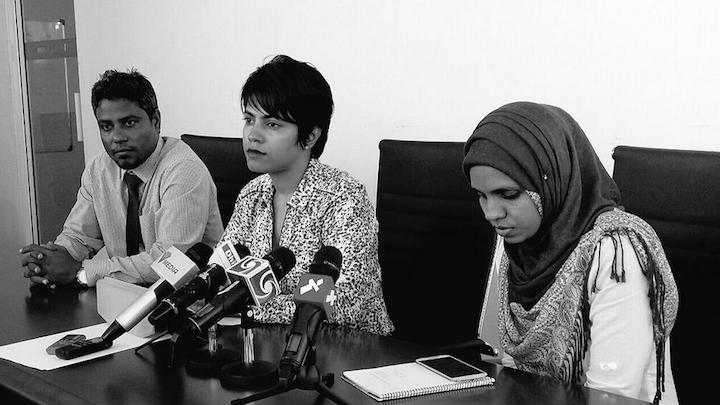The government has banned foreigners from providing photography-related services as well as operating souvenir shops and customs bonded warehouses in a bid to boost youth employment.
Registrar of companies Mariyam Visam told the press yesterday that the ministry will not register foreign investments in the selected fields.
Foreign investments in passenger transfer services and water sports will also be restricted to partnerships with companies with at least a 51 percent stake owned by Maldivians.
“If Maldivians can’t enter these ancillary services in the tourism industry, the economy and standard of living will be adversely affected,” she said.
“Even if we provide many opportunities for foreigners to invest in the Maldives, our main objective is economic development and increasing economic means for Maldivians.”
Most local photographers and souvenir businesses have welcomed the ban. But some have said foreign investments are crucial for small and medium enterprises to thrive.
Some 26.5 per cent of Maldivians aged 15 to 24 are unemployed, according to World Bank statistics from 2013, the most recent figures available.
“Good move”
The secretary general of the Maldives Photography Association, Ahmed Ishan, said the ban would create more opportunities for local photographers.
“There are about 1,500 Maldivian professional photographers in the industry. But Maldivians aren’t allowed on some resorts due to the influence of some [foreign] companies,” he said.
The foreign companies were established in 2012 and primarily employed photographers from Philippines and China, he said. They were often “stationed” at resorts as resident photographers.
“So all the work goes to them,” he added.
He also claimed that some of the photographers had fraudulent work permits.
In January, the economic development ministry ceased issuing work permits for foreign photographers while a ban on foreigners working as cashiers took effect in April.
Last week, the immigration department instructed local businesses to send back migrant workers hired as photographers and cashiers before June 7 and apply for cancellation of employment approvals. The department warned that employers who do not comply will be penalised.
The economic ministry has meanwhile penalised 88 businesses found to employ foreign cashiers.
The ministry will conduct inspections on the new rules and offer a period for foreigners involved in restricted business to leave, Visam said yesterday. Agreements with foreign parties will not be renewed and the ministry will take action against businesses registered under Maldivians but operated by foreigners, she warned.
The souvenir trade
Hassan Zahir, the manager of the Misraab souvenir shop, welcomed the move as a positive step as many Maldivians were involved in the souvenir trade.
“This is an ordinary or medium-sized business, so it’s not good when foreigners come in. Not everyone can be resort owners,” he said.
The restrictions will create job opportunities for young Maldivians in the absence of competition from foreign businesses who have more resources and more capital, Zahir suggested.
However, officials from another souvenir business, who wished to remain anonymous, questioned the effectiveness of the move, noting that foreigners operate the souvenir shops in resorts run by foreign companies.
Maldivians should be allowed the opportunity to run souvenir shops in all resorts, they said.
Meanwhile, Saudhulla Ahmed, secretary general of the Maldives Trade Union, an NGO set up last year for advocacy on behalf of small and medium-sized businesses, told Minivan News that foreign investment was crucial for small businesses to thrive.
Foreign investors had set up enterprises almost exclusively in partnership with Maldivians in the restricted fields, he said
Saudhullah also said the government has impeded small businesses by cutting electricity subsidies and reducing business hours with a 10:00pm closing time.
Local businesses are”living in fear” and lacked security for their investments due to arbitrary measures from the government, he continued.
“We have had complaints from businesses about the customs saying they mistakenly charged too little as duties for goods imported two years ago, and so customs is now asking for MVR230,000 in fines,” he said.
The ministry was imposing restrictions on foreign investments “because they know for sure that investors won’t come to such a frightening place,” he said.







These are good steps I suppose in giving Dhivehin the impression that government has the best interest of local businesses in mind. Only time will tell how this pans out...
But tbh, souvernier shops should be all shut down - they are the antithesis of 'paradise' and 'eco tourism' and all the warm and fuzzy marketing terms used to promote Maldives. There is no such thing as Maldivian souvenirs anyway. They are mostly all imported with 'Maldives' stamped on them (probably made buy some poor sweat shop worker) and sold at exorbitant prices. (We don't have monkeys or elephants in Maldives, so why anyone would think tourists want to buy that here blows my mind!?!?). I look forward to the day that local crafts people and artisans are seen and valued as part of the local 'small business' community and the government injects funding and proper regulation for such people to thrive. Right now, souvenir shops prefer to buy cheap mass produced junk to local handmade stuff which, yes, would cost a bit more, but why not? It's creating opportunities for beloved locals ennu!
The ban is definitely acceptable on all those areas except 'bonded warehouse' in customs areas. Bonded warehouse operations in Maldives involve mainly Pork products, Liquor, Tobacco, perfumes, etc.
For over 30 years some foreign and joint venture companies have operated the Liquor and Pork businesses which, if I remember very well, Maldivians were in a way prohibited to be involved with handling of such products, as they were haram. The operation and management of liquor and pork bonded warehouse require immense expertise, logistics and professional manpower, preferably non-mulsim as tasting and sampling of such products is common during marketing.
These two bond operations cannot be under 'small businesses' as they require substantial investments which is in millions of dollars in stocks, storage facilities and high cost manpower. Most of the products are under international 'Agency Distributor Laws' whereby the distributor in Maldives, e.g. Yeoman Agencies, cannot sell Tiger Beer (was appointed agent in Maldives) to another country. It will be a breach of contract and a huge fine plus revoke of its licenses if found guilty. All of the existing foreign investors in liquor and pork have creditors and suppliers of who millions of dollars are owed to. In addition, stocks for the coming season are already ordered and some sailing. It is therefore unrealistic for authorities in Maldives to abruptly halt such investments with prior discussions.
Employment Opportunities
It is for the interest of everyone that our youth are accommodated in business industry, or to be specific in bonded warehouse operations. But let us be realistic:
JOBS: liquor and pork bonded warehouse operation employs a small work force mainly accountant, administrator, sales persons and bond keepers. As per prevailing Immigration laws, Maldivians are more in number than the foreigners in bond operations. Secondly, more Indian, Bangladesh or Nepalese are employed as 'bond keepers' simply because Maldivian youth have never appreciated working as laborers lifting kegs, handling boxes, touching chilled pork products from containers into supply boats. Last but not least salesmen in such operations are people who MUST have educational background of liquor or pork.
Bonded warehouse operations does not employ a huge number of people unless its mega companies like Grape Expectations managed by Lily F&B. The investment is huge and the expertise needed to run it is also costly and therefore not a small business where anyone can just start. Take an example of Grape Expectations or Divine bonded warehouse. The are extremely huge with strong financial backing and therefore they can employ professional staff mainly expatriates simply because Maldives does not have educated people in that field in addition to religious implications on promoting or selling these haram products.
For the past 30 years Maldives tourism industry has enjoyed the service and expertise from these foreign investment in bond operations. The Maldives has seen the imports of the best or top quality products in the world (wines, beers, spirits) and this aspect plays an important role in making Maldives a high-end market of quality. All these companies pay taxes and respect government policies and never have they deviated into any illegal practices. As a businessman, I ask the government why it is promoting foreign investments yet on the other hand trying to unprofessionally terminate contracts of foreign investors dating back to the 80s. Some of the bonded warehouse operators have already started investments in Maldives in other sectors like energy, technology, and agriculture.
It is therefore necessary that the government elaborates on the term 'bonded warehouse' and if actually includes liquor and pork products, then I believe the best option is to reconsider the decision, sit down with these investors and come to an understanding that will benefit the country as well as the investors. There is no bonded warehouse in Maldives today that will have the market, ability and legal means of disposing off the huge stocks, and be able to face legal actions from creditors and suppliers. Closing such operations will not benefit the youth nor the country but actually deviate foreign investors and creating more uneasiness to those who want to invest.
And to those who think managing a liquor & pork bonded ware house is easy, well, think twice. It is a massive investment with very huge risks, and those risks are felt today with the chinese market spending literally nothing on F&B products on resorts. Liquor business in resorts is extremely low and therefore all bonded warehouses are facing stiff times.
Formal education among the unemployed youth is very below expectations and does not and will not allow the youth to get the 'white color' jobs or professional jobs in any industry. Most of the girls and boys would have reached O level having done science subjects. Some join local colleges to study business administration or tourism studies, professions which have no scope in Maldives today.
A few study economics, commerce or art subjects like history, geography, etc. but to financial constrains, most cannot continue studies but end up in odd jobs.
Maldives is begging for investments. The best would be to get foreign companies to invest in 'polytechnic institutions' places where these kids with not much strong background can get short term training in fields that offer them the skills to work and earn more than an office job:
* Electronics
* Internet technology
* Carpentry and wood work
* Embroidery
* Engineering (for repairs of motorbikes, dhoni engines and small vehicle engines)
* Refrigeration
Once these kids get the knowledge to handle any of the above, I am certain they would earn better, even promote own businesses as well as enjoy the hundreds of contracts awarded to foreigners. Empowering Maldivian youth can only work by giving them tools that would make them work to earn. Giving them loans may benefit a few educated but the majority will lose out.
Institutions for skilled profession is the only way Maldivian youth can make a living.